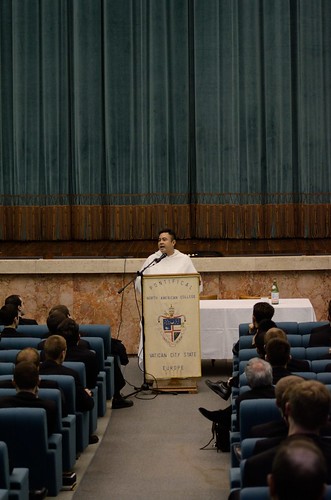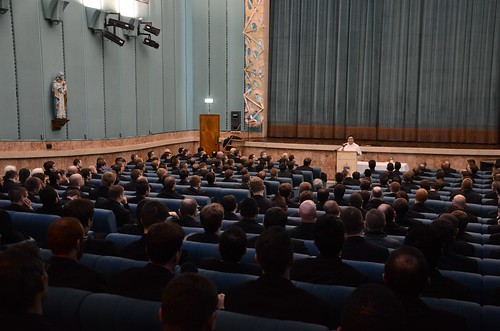Catholic Bioethics and How to Preach It
 With priests and seminarians filling the Corso Auditorium at the Pontifical North American College, Father Nicanor Austriaco, O.P., delivered the Carl J. Peter Lecture on “Preaching Catholic Bioethics with Mercy and Joy” on Sunday, March 2.
With priests and seminarians filling the Corso Auditorium at the Pontifical North American College, Father Nicanor Austriaco, O.P., delivered the Carl J. Peter Lecture on “Preaching Catholic Bioethics with Mercy and Joy” on Sunday, March 2.
Every year the Carl J. Peter Chair of Homiletics, currently held by Father James Quigley, O.P., invites a speaker to address the seminary community on a topic related to preaching. Father Quigley began the evening by introducing his brother Dominican. Father Nicanor holds a Ph.D. in Biology from the Massachusetts Institute of Technology and is currently pursuing the Doctorate in Sacred Theology from the University of Fribourg in Switzerland. He teaches both biology and moral theology at Providence College in Providence, RI, and in 2011 published his first book, Biomedicine and Beatitude: An Introduction to Catholic Bioethics as part of the Catholic Moral Thought Series from The Catholic University of America Press.
Throughout his lecture, Father Nicanor sought to answer the question, “How do we speak about Catholic bioethics today? How will you [priests and seminarians] preach it?”
His answer revolved around three words: desire, joy, and mercy.
The Catholic priest must preach the liberating message of Catholic bioethics in a way that encourages others to develop virtues, and virtues involve the perfection of a person’s desires. The priest must help people to desire their authentic good, what is truly best for them and for their life in God.
“Joy,” he said, “is the delight you experience when you finally possess what you desire. Everyone is seeking joy.” So the priest must help others to desire what is truly good for them, and lead them into the liberating joy of the moral life.
Finally, mercy. The priest is a minister of mercy and must always offer the mercy of God.
Father Nicanor developed these three themes with reflections and stories that provided practical examples of how a priest might live out this high calling. His experience in ministry with organizations like Project Rachel and his work with his students not only helped to explain his points, but also provided a model to be imitated.

